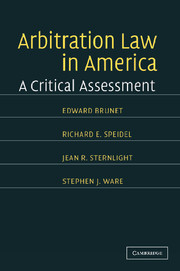Book contents
- Frontmatter
- Contents
- Acknowledgments
- Introduction
- 1 The Core Values of Arbitration
- 2 Common Legal Issues in American Arbitration Law
- 3 The Appropriate Role of State Law in the Federal Arbitration System: Choice and Preemption
- 4 Interstate Arbitration: Chapter 1 of the Federal Arbitration Act
- 5 Consumer Arbitration
- 6 International Commercial Arbitration: Implementing the New York Convention
- 7 Tension Points: Where the Authors Disagree
- Appendices
- Index
3 - The Appropriate Role of State Law in the Federal Arbitration System: Choice and Preemption
Published online by Cambridge University Press: 16 November 2009
- Frontmatter
- Contents
- Acknowledgments
- Introduction
- 1 The Core Values of Arbitration
- 2 Common Legal Issues in American Arbitration Law
- 3 The Appropriate Role of State Law in the Federal Arbitration System: Choice and Preemption
- 4 Interstate Arbitration: Chapter 1 of the Federal Arbitration Act
- 5 Consumer Arbitration
- 6 International Commercial Arbitration: Implementing the New York Convention
- 7 Tension Points: Where the Authors Disagree
- Appendices
- Index
Summary
INTRODUCTION AND OVERVIEW
At present the role of state law in our American arbitration system is murky at best and bizarre at worst. Arbitration is a species of contract law and contract law is largely left to the states. Principles of federalism, enshrined in contract theory, could be expected to lead to a situation in which state arbitration law was applied routinely and expansively. We are supposedly in the midst of a federalism revival at the Supreme Court. Yet, the present status, that of supremacy of federal arbitration law and of rare judicial application of state arbitration legislation or state common law rules, is far from hospitable toward state arbitration law. Surprisingly, the word federalism appears rarely in arbitration opinions and arbitration decisions seldom show sensitivity toward subtle points of state arbitration theory. It is strange that the recently amended RUAA is a comprehensive, modern system of arbitration that may have minimal applicability. The RUAA seems to only apply to a narrow band of purely intrastate transactions under the broad holding of the leading Allied-Bruce Terminix v. Dobson decision.
As long as a contract to arbitrate affects interstate commerce, the Terminix doctrine requires application of the Federal Arbitration Act (FAA). This leaves the everyday application of the state arbitration acts to those rare instances when transactions have no impact or connection with interstate commerce. In a phrase, state arbitration legislation applies to transactions that are purely intrastate in nature.
- Type
- Chapter
- Information
- Arbitration Law in AmericaA Critical Assessment, pp. 63 - 87Publisher: Cambridge University PressPrint publication year: 2006



